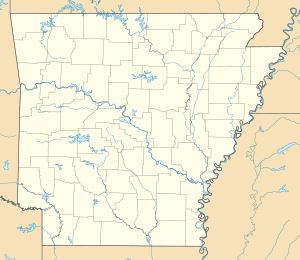Eaker Air Force Base
| Eaker Air Force Base Blytheville Air Force Base Blytheville Army Airfield |
|
|---|---|
| Part of Strategic Air Command/Tactical Air Command | |
| Blytheville, Arkansas | |

USGS 2006 airphoto
|
|
| Coordinates | 35°57′52″N 89°56′38″W / 35.96444°N 89.94389°WCoordinates: 35°57′52″N 89°56′38″W / 35.96444°N 89.94389°W |
| Type | Air Force Base |
| Site information | |
| Controlled by | 461st Bombardment Wing (1956–1958) 97th Bombardment Wing (1959–1991) |
| Site history | |
| Built | 1942 |
| In use | 1942–1946, 1953–1992 |
Eaker Air Force Base (1942–1992) was a front-line United States Air Force base for over 40 years. It was located 3 miles (5 km) northwest of central Blytheville, Arkansas. It was closed as a military base in 1992 at the end of the Cold War pursuant to BRAC action and now operates as Arkansas International Airport.
The military still makes use of the Arkansas International Airport in flight training maneuvers, and as a landing site to pick up and drop off local Arkansas National Guard personnel.
Known for most of its operational life as Blytheville Army Airfield (1942–1946) or Blytheville Air Force Base (1953–1988), the facility was renamed Eaker Air Force Base on 26 May 1988, in honor of General Ira Eaker, an air pioneer and second commander of Eighth Air Force during World War II.
Eaker was the architect of a strategic bombing force that ultimately numbered forty groups of 60 heavy bombers each, supported by a subordinate fighter command of 1,500 aircraft, most of which was in place by the time he relinquished command of Eighth Air Force at the start of 1944.
During its operational lifetime the mission of Eaker Air Force Base was that of a training base during World War II and both a tactical as well as a strategic bomber base during the Cold War. After the Cold War, the Base Realignment and Closure (BRAC) 1991 commission recommended Eaker be closed in a cost-cutting move. The facility closed on 15 December 1992.
Blytheville Army Air Field was originally a 2,600-acre (11 km2) installation used by the United States Army Air Forces during World War II as a training airfield as part of the 70,000 Pilot Training Program. It was one of many air fields created in the country’s interior during the war. Airfield construction was that of an overlapping square design, with three large ramps for aircraft parking and two parallel N/S concrete runways; 5000x150(NE/SW), 5000x150(NW/SE). In addition to the main airfield, four axillary fields were constructed to support the training mission. Those were located as follows
...
Wikipedia


